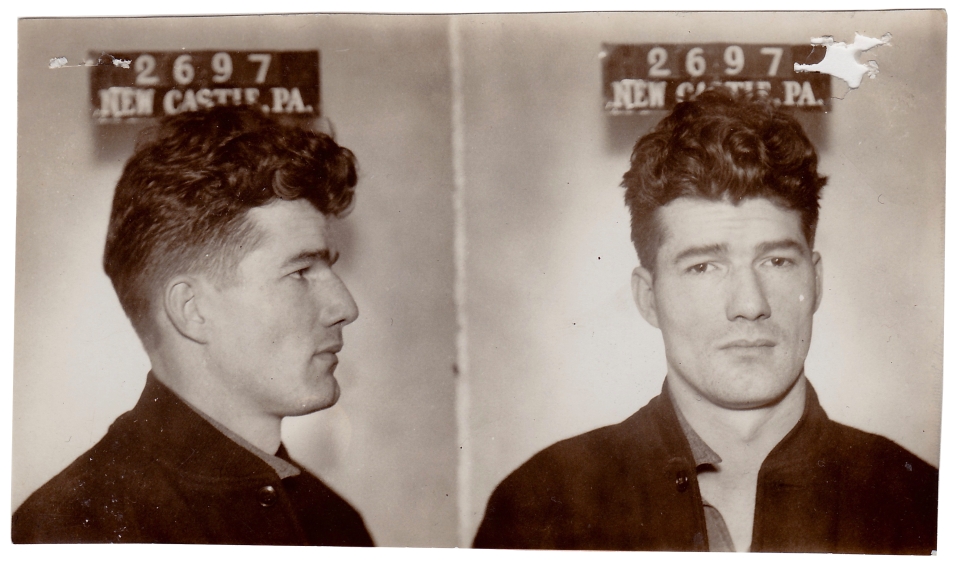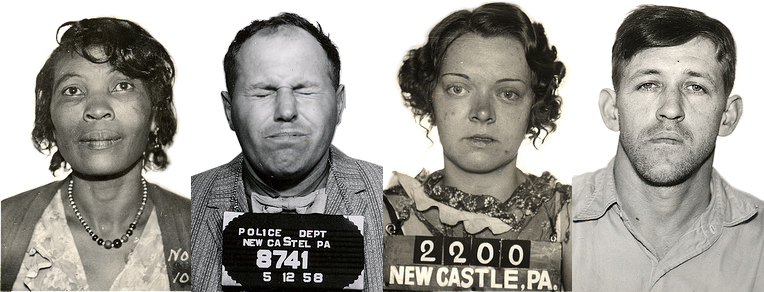
When Walter Tomski was arrested in January, 1938, his father, Frank, was in the workhouse and his brother Chester was in the reformatory. That month, the New Castle police made almost a hundred arrests for intoxication; eleven for disorderly conduct; eight for loitering; six for being a suspicious character; twelve for fighting; nine for running a brothel; another nine for visiting a brothel; three for intoxicated driving; one for speeding; and one for carrying a concealed weapon.
There were also arrests for gambling, vagrancy, begging, indecent assault and violation of parole. And there was Walter, who was charged first with adultery and then, because of what he did when the adultery was discovered, with assault and battery.
Walter was married to a young woman named Mary. In 1935—three years before the arrest—when Walter was twenty-two and Mary was eighteen, they were living in Blacktown, a small township north of New Castle. Walter had been injured in an accident at No.5 Mine and couldn’t work, so Mary got a job in a night club in Grove City. On her first night, the manager tried to rape her. She had to fight him off. She told Walter but he said she should go back to work. There were no other jobs. The manager tried to rape her again, so she quit anyway. They had no money until Walter was well enough to go back to the mine.
The adultery and assault and battery charges were dropped before a trial could be arranged. Mary divorced Walter.
Two years later, Walter married a woman named Dolly, in Winchester, VA. That was a mistake. They separated almost immediately. A few months after their divorce came through, at the end of 1941, Walter married a woman from West Virginia, Wanda Cawthorn. He and Wanda had two daughters. They lived in Brookville, where Walter did some work in the lumber and building trade. Ten years later—by this time, he was running a tavern in town—he drove his motorcycle straight into a truck loaded with nine tons of wood that appeared over the crest of a hill in front of him when he was overtaking a long line of cars. It was dark, and Walter had no lights on his bike. The two men in the truck—both just nineteen years old—were killed instantly, but Walter was fine.
In February 1958, Walter bought a roadhouse about a mile west of Kane, on the other side of the Allegheny national forest. It had stood there for as long as anyone could remember. It used to be called the Chat-A-Wile, but it changed its name to the Brown Derby in the early 1930s, after the famous Brown Derby in Hollywood. Walter and Wanda kept the name but started to remodel and improve the building. They got live bands to play on Friday nights—the Tumbleweeds, the Monitors, Billy Lehman’s Rock-Itts. They had special menus three days a week—spaghetti and meatballs on Thursdays, a fish fry on Fridays and chicken in the ruff on Saturdays. They did good business.
Walter got sick in the middle of December that year. By Christmas, he was too ill to move. The doctor said he had leukemia and would die soon. He had to spend a lot of time in hospital and Wanda couldn’t keep the Brown Derby open. Spring came and they found someone to run it for them. Walter came home from the hospital in time for the first day of business—a Saturday in May, which meant fried chicken. After closing time that night, there was a fire, caused by faulty electrical work from the Chat-A-Wile days. It destroyed most of the parts that Walter and Wanda had renovated. Walter died the following week. He was forty-six years old.
Wanda sold the remains of the Brown Derby to Joe Rolick, who owned a sawmill and led a polka band. He reopened it as Joe’s Tavern. She got work as a receptionist in Brookville, and died in 2007, at the age of eighty-eight.
Sources: New Castle News (7 May 1938, “After Big Fellows In Numbers Game is Court Warning”; 14 May 1938, “Five Persons In Sentence Court”; 8 February 1938, “Around City Hall”; 14 May 1941, “On Court House Hill”; 14 may 1959, “Deaths Of The Day”); Kane Republican (2 April 1931, “Two Hurt In Head-On Collision Near Here”; 15 September 1932, “In A Paragraph”; 2 May 1959, “Small Ads”; 5 May 1959, “Brown Derby Fire Causes $2,000 Loss”; 13 May 1959, “Brown Derby Tavern Owner, 46, Succumbs To Leukemia Illness”; 25 July 1959, “Kane Area Couple Buys Brown Derby”; 31 December 1959, “Republican Presents The Headline News Of The Year In Kane”); Jeffersonian Democrat, 6 September 1951, “Two Die In Motorcycle Wreck”; Brookville American, 1 August 1935, “Night Club Prop Attacks His Help”.

What a not-wonderful life. Happy new year to you, Diarmid!
And to you!
Love reading these , thank you
Thanks, Renee.
Amazing research. Well done. Thank you.
Thanks for the thanks, Erik. I appreciate it!
If you want the soundtrack to this post and search for tunes by Billy Lehman’s Rock-Itts, stick wit the instrumentals:
That’s pretty good, isn’t it? The idea of hard-working lumbermen driving over to the tavern outside town to listen to a band playing this stuff is almost unbearably romantic to me — although filmic is probably what I mean, really. All gone now. Heartbreaking.
Frank Tomski had 3 sons that have been featured in this forum – John, Walter, and Chester.
All died early in life – Sad stories all.
Thanks for your hard work researching these stories.
Thanks for reading, JM!
Another fascinating write-up. I can’t believe he survived a collision with a truck when he was on a motorcycle–and the truck drivers were killed!
Yes, it’s quite amazing, isn’t it?
Hey Diarmid! Been a fan of this site for several years. I noticed it’s been some time since you’ve had any new posts. Are you okay? Have you run to the end of mugshots? You don’t owe me or any of the readers anything, just curious and hoping things are well.
Hi Nate. Thanks for writing. I’m absolutely fine — don’t worry! Yes, as you suspect, the supply of mug shots has dried up. There are still a few out there, but they seem to be ones that I’ve already researched and found no stories about. (If I can, I do all the research before buying them, you see.) I keep my eye on eBay, and I’m always hopeful that someone will get in touch to say they have a collection they want to offload. Thanks again for getting in touch!
So Walter was charged with adultery because he wasn’t divorced yet? And who did he assault? The rapist manager ?
Frustratingly, there’s no record of who he assaulted, or who he committed adultery with. The only record of it is the arrest card. But thanks for leaving this comment, which has made me aware that the way I’ve written the story is a little confusing. I probably should have kept things in a chronological order and not mentioned the adultery/assault arrest until after the part about Mary in Grove City. I’ll rewrite it for the manuscript version. Thanks again!
My Grandmother Wanda Elizabeth Cawthorn was Walter’s third wife. Late in life she mentioned that my Grandfather Walter B. Tomski had a previous marriage. I do not believe that his daughters had knowledge of the previous marriage/marriages. My Grandmother shared that some of the Tomski brothers had a criminal history. I never realized that my Grandfather had been arrested. He died years before my birth in 1961. My Grandmother described him as a hard worker, successful business owner and a generous man. He loved my Grandmother and his daughters. It was tragic that he died at such a young age. Although an interesting read this was information that I really did not need to know about his life.
Thanks for leaving a comment. I’m glad you found the story interesting, and I’m grateful to you for taking the time to write with your grandmother’s description of Walter.